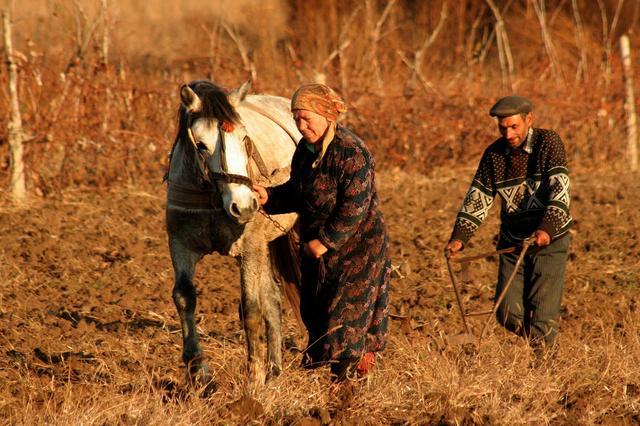You have different things : cloth, shoes, rower. You use them. Can you do with them, what do you like, e.g.. destroy, give, sell ? No ! You are dependent on your parents. You must take into account the welfare of the whole family.
Your parents own many other things more important than yours. Whether they are completely independent in using their property ?
Is it allowed for a man to use his property disregarding anyone? ?
Threats
Man does not live alone on earth. He lives and works with others. And all people are interdependent. You depend on your parents, your family from society, in which he lives. Society depends on this again, what is happening all over the world.
Everyone needs material goods for life. Family and nation - everyone needs them, who live on earth. Without them, no one can live and develop - be a free man. That is why man uses land and seas, mountains and valleys, rivers and lakes. It even uses the riches of the desert. Earth is for all people. Everyone has the right to use it, to get it, what is needed for life. Meanwhile, an unfair division of the land among people took place in the world. Some have too much of it, others less than is necessary for a life worthy of man. Some nations get richer, and the lives of other nations are living in dire poverty. Many agricultural products are destroyed in rich countries, to keep prices up, and thousands of people go hungry in poor countries. I spend huge sums on armaments, and lack of money for such social purposes, like fighting hunger, illiteracy, with social diseases, leprosy or other misfortunes plaguing mankind. Is it fair ? Nothing unusual, that these matters cause widespread injustice and dissatisfaction. Greed and selfishness close the heart and blind the eyes. You do not see these contradictions and you do not seek solutions to growing conflicts. This constantly leads to new disputes and wars.
The spirit of Christian poverty
And yet God created the world for all people and gave it to man, to rule over him and subdue the earth, for his own good and for all people (by. Gen. 1, 23). Various social systems have developed over the centuries, who often unfairly divided material goods among people. It was not an expression of God's will. Human nature, prone to selfishness and greed, was the source of evil and harm.
The Church has emphasized this many times. Especially in recent times, popes have come back to these matters very often.
John XXIII published the encyclical Mater et Magistra (About contemporary social changes in the light of Christian science), which caused a great stir in the world. In it he talks about the fair distribution of material goods and the social responsibility of the owners. The Pope reminds us of the teaching of Christ and its topicality in our time.
This issue is also dealt with by Pope Paul VI. In the encyclical ,,Development of Nations " (Development of Peoples) reminds, that less developed nations have the same right to the achievements of modern civilization as the rich nations. It therefore demands a fair distribution of goods. The Second Vatican Council also dealt with the problem of social justice in the light of revelation. The council declared:
,,Now, for the first time in history, all nations are convinced, that the blessings of culture can truly be enjoyed by all. Underneath this claim there is a deeper and more universal tendency, namely, people and groups of people want a full life, a free and worthy man, in taking advantage of everything, what today's world can provide them in abundance " (KDK 9).
In the same document, the council recalled, that :
“Man, when using these goods, should consider external things, which he has, not only for your own, but considered common in this sense, not only for him, but they also benefited others " (KDK 69).
All these statements of the Church are nothing else, how the teaching of Jesus Christ about riches and poverty is recalled in contemporary language. Jesus Christ does not reject private property, but he teaches, how to treat it and how to use it. In the parable of the rich man and Lazarus, Jesus Christ condemns the rich man for not doing this, that he had a lot, but for that, that he was using it badly (by. Luke 16, 19-31).
Likewise, in the Sermon on the Mount he commends the poor in spirit and invites everyone, lest they become too attached to their property (by. Mt 5, 1-3). At other times, a "fool."” he calls it, who builds his happy future on the accumulated riches (by. Luke 12, 20).
If people would take the teaching of Christ and understand well, that the spirit of Christian poverty is based on justice and love, humanity would be happy.
How will I answer God ?
In the course of your life, you will come to possess some property. Your work will be the main source of it. You will also be able to obtain the property in other ways fairly, e.g.. : by donation, Inheritance, purchase. But you understand, that in using this property you must take into account the common good. remember, that you too are always in danger of selfishness and greed (by. 1 Tm 6, 10).
How do you treat it, what do you have ? Can you share with your neighbor ?
Consider. Maybe you like the myth of modern times about it, that ,,money is all ”and woe to it, who does not have it. Idea. Isn't justice and love more important? ? Do you look to the Gospel, to better understand and love Christ's teaching on the spirit of poverty ?
■ Think :
1. Dlaczego człowiek winien coś posiadać ?
2. Co sprawia, that material goods become a source of conflicts and unrest in the modern world ?
3. Co jest główną przyczyną niesprawiedliwego podziału dóbr materialnych ?
4. Dla kogo Bóg stworzył dobra materialne tego świata ?
5. Kto przypomina dzisiaj naukę Chrystusa o stosunku do dóbr materialnych ?
6. Czego Chrystus uczy o bogactwie i ubóstwie ?
■ Remember :
38. Do kogo należą dobra materialne ? Material goods belong to God, and by His will to all mankind.
39. Jak chrześcijanin powinien używać własności ?
A Christian should use property according to God's will and for the good of all people.
40. Co to jest chrześcijański duch ubóstwa ?
The Christian spirit of poverty is the control of greed and the lust for possession in order to realize social love in God's kingdom.
■ Task :
1. Read from the Scriptures. Christ's call to poverty (Mt 19, 16-30).
2. Zapoznaj się z warunkami pracy misjonarzy w Trzecim Świecie i zastanów się, what you should help them with and how you could do it ?










